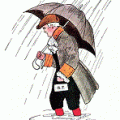The evolution of the play instinct, gender difference and peer-based learning
A bit of personal interest here.
By complete chance I've just seen the BBC2 programme "Nature's Weidest Events"... Clicky,
Overall I found it simply entertaining.
However the last item concerned a troop of chimpanzees in Uganda, which some primatologist dude, Richard Wrangham has been studying. His observations touched several matters of keen interest to me. Completely unexpected. It kicks in at 46 minutes on the link above.
The good Dr. Wrangham has observed that younger chimpanzees will often select a rock or a stick, take possession of it and begin to cherish it: carrying it on their back, holding it and building a small nest for it. Wrangham has never witnessed an adult chimp engaging in this activity or demonstrating the activity to young chimps. The youngest chimps appear to pick it up by watching older juveniles. Both genders engage in this behaviour, but Wrangham has observed 3 times as many instances of this behaviour in females than males. Females stop displaying this behaviour once they have their first baby.
As someone who works with young kids, the idea that the evolution of this kind of object and imaginative play predates humanity is not something that I have considered before. I love the idea that the only significant thing that differentiates a chimp-child nursing a rock and a human-child nursing a doll is a technological one (i.e. the ability of humans to create more lifelike surrogate babies). I will certainly be using the video on one of my training sessions that touches (albeit briefly) on the (evolutionary) functions of play in human children.
The gender difference observed by Wrangham is what I would expect (my being a devotee of evolutionary psychology), but it's always useful to see more evidence of this. At the same time, important to note that male rock-doll play is not zero. As Wrangham points out chimp fathers do have some parental role, and do take responsibility for carrying baby chimps (if not as much as mothers). As is often the case, evolution results in gender roles being somewhat different; not dichotomous.
I absolutely love that the rock-doll play is passed on peer-to-peer through the generations, with apparently zero adult input. Absolutely love that. Probably a minor point for many people, but it ties in perfectly with what I understand to be the case with regard to the importance of peer culture (vis-à-vis adult influence) in human child development. In fact I shed a little tear when that came up in the programme.
It would be interesting to understand a bit more about the relationship between the instinct to play "mummies and daddies" and the environmental learning that gives form to this instinct.
I notice another short vid involving Dr Wrangham's chimp rock-dolls here. Not quite as good or detailed, but still worthwhile.
Anyway, Amazing what one can find by chance. :-)

Comments
Always pleasing to hear or read some decent vocabulary!
Tho apologies for being so stereotypical. I am a qualified teacher, with history qualifications and a keen interest in biology. :-D